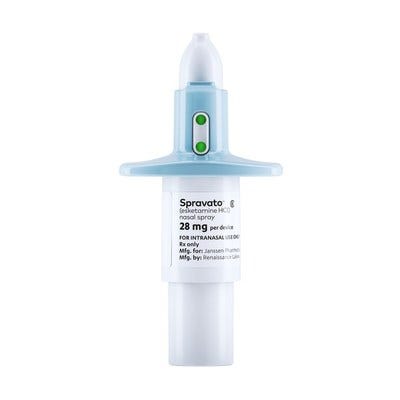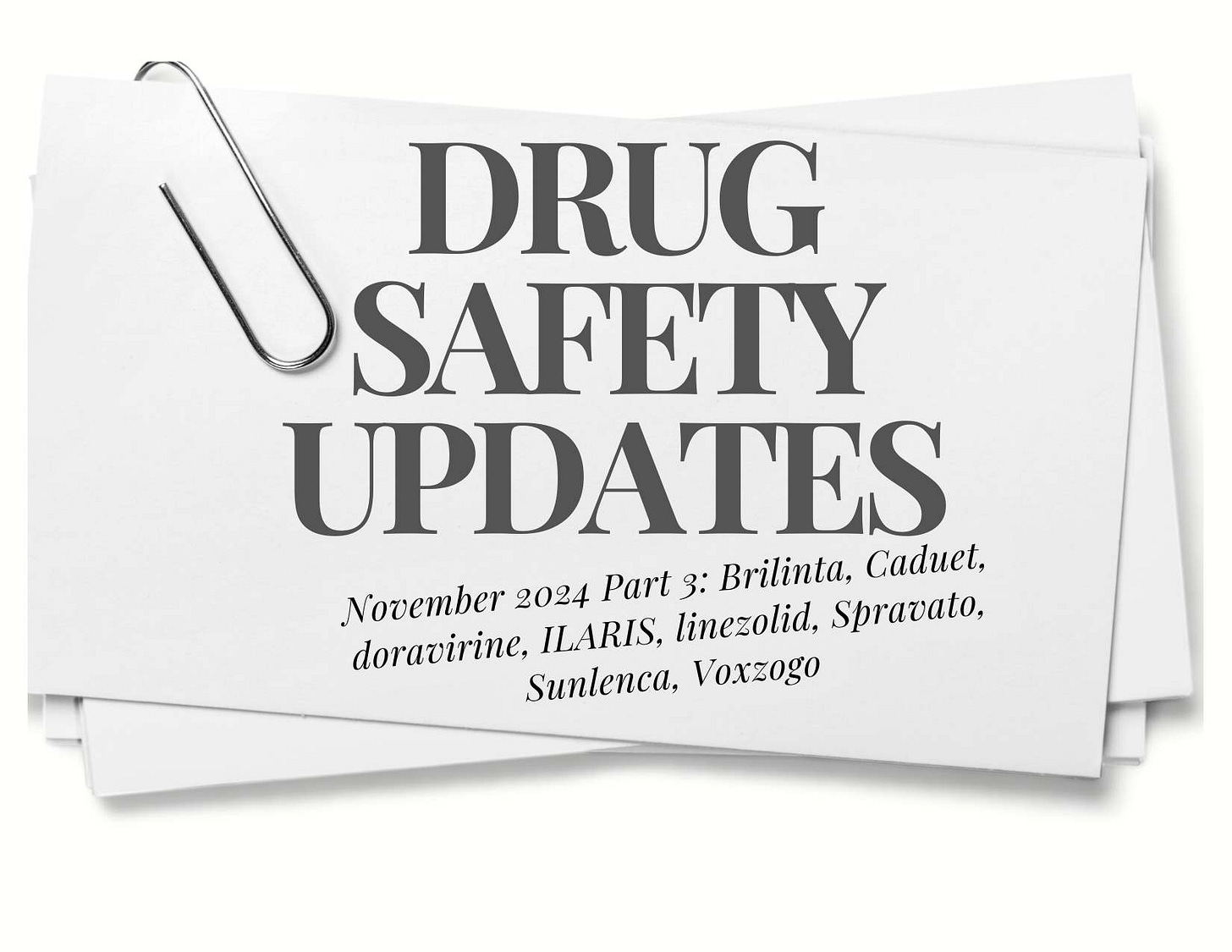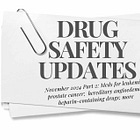November 2024 Drug Safety Updates Part 3: Brilinta's interaction with rosuvastatin; Caduet; 3 HIV drugs; ILARIS for autoinflammatory disease; Spravato for treatment-resistant depression
Consumer-friendly summaries of new safety information added to Food and Drug Administration (FDA) drug labels
Brilinta (ticagrelor) tablets
Brilinta is an antiplatelet medication used with low-dose aspirin by patients after heart attack, stent placement, or by those with acute coronary syndrome to lower the risk of stroke or heart attack. Its label was updated to warn of interactions with the cholesterol drug rosuvastatin (brand name Crestor).
Because Brilinta increases the concentration of rosuvastatin in the blood, patients taking it should be monitored for statin-related adverse effects. Brilinta was initially approved in 2011.
Brilinta FDA Safety Label Change
Read or add Brilinta Patient Ratings and Reviews at Ask a Patient website
Caduet (amlodipine and atorvastatin) tablets
Caduet is a combination of amlodipine besylate (a calcium channel blocker used to treat high blood pressure) and atorvastatin calcium (used for treating high cholesterol, brand name Lipitor). Caduet had its label updated to include the rare risk of new-onset or exacerbation of myasthenia gravis, including ocular myasthenia, and reports of recurrence when the same or a different statin was administered. Myasthenia gravis is a disease causing general muscle weakness, weakness in muscles used for breathing, and sometimes eye muscle weakness (ocular myasthenia).
Patients are advised that Caduet can increase the risk of muscle problems or other side effects. Patients are also now advised to tell healthcare provider if taking immune system medications, including cyclosporine. Caduet was initially approved in 2004.
Learn more about myasthenia gravis at Medline Plus:
https://medlineplus.gov/myastheniagravis.html
Caduet FDA Safety Label Change
Read or add Caduet Patient Ratings and Reviews at Ask a Patient website.
Lipitor and other atorvastin-containing drugs had similar label updates warning about myasthenia gravis earlier this year.
Delstrigo (doravirine, lamivudine, tenofovir disoproxil fumarate) and Pifeltro (doravirine) for HIV-1
Delstrigo is a three-drug combination used as a complete regimen for the treatment of HIV-1 infection in adults and pediatric patients weighing at least 35 kg with no previous antiretroviral treatment history (or certain other conditions). Its label was updated to add a section on the risk of severe skin reactions, including Stevens-Johnson syndrome (SJS)/toxic epidermal necrolysis (TEN). Patients are advised to tell their healthcare provider if any rash develops, and to discontinue Delstrigo and other medications known to be associated with severe skin reactions which may include those on mucosal surfaces such as the eyes or in the mouth.
The lactation section of the label reports that serious adverse reactions in a breastfed infant are similar to those seen in adults. Delstrigo was initially approved in 2018.
Delstrigo FDA Safety Label Change
Pifeltro (doravirine) tablets are also for HIV-1 infection but are to be used in conjunction with other antiretroviral treatments. Pifeltro had the same label changes as Delstrigo regarding risk of severe skin reactions including Stevens-Johnson syndrome and the same lactation risk updates. Pieltro was initially approved in 2018.
Pifeltro FDA Safety Label Change
Add Patient Rating for Pifeltro at Ask a Patient website
ILARIS (canakinumab) subcutaneous injection
Autoinflammatory disease treatment ILARIS had its drug label updated to add a new section on serious hypersensitivity reactions of skin and subcutaneous tissues, including post-marketing reports of "Drug Reaction with Eosinophilia and Systemic Symptoms (DRESS)." Also called drug hypersensitivity syndrome, DRESS mainly affects adults. Read more on the topic here:
https://dermnetnz.org/topics/drug-hypersensitivity-syndrome
Patients are advised to stop taking ILARIS and contact their healthcare provider and get emergency help if experiencing symptoms of a serious allergic reaction, such as difficulty breathing or swallowing, nausea, dizziness, skin rash, itching, hives, palpitations, or low blood pressure. ILARIS was initially approved in 2009.
ILARIS FDA Safety Label Change
Add Patient Rating for Ilaris at Ask a Patient website
Linezolid in sodium chloride 0.9% in plastic container (linezolid)
Linezolid is an intravenous antibacterial approved for adults and children. It treats infections caused by gram-positive bacteria such as hospital-acquired pneumonia, community-acquired pneumonia, and complicated skin infections such as diabetic foot infections. Its label was updated to warn of the risk of rhabdomyolysis. Rhabdomyolysis is the breakdown of muscle tissue that leads to the release of muscle fiber contents into the blood. Once in the blood, the substance, called myoglobin, may cause kidney damage. A telltale sign of this condition is very dark urine. Linezolid was approved in 2000.
Linezolid in sodium chloride FDA Safety Label Change
Add Patient Rating for Linezolid in sodium chloride solution or Linezolid at Ask a Patient website
Also see this similar update for the antibiotic Zyvox (linezolid tablets, injection, and oral suspension) in June 2024 and the risk of rhabdomyolysis.
Spravato (esketamine) nasal spray
Spravato nasal spray is used along with an oral antidepressant to treat adults with treatment-resistant depression or those with major depression experiencing suicidal thoughts. Considered a psychedelic medicine, Spravato is administered under the supervision of a healthcare provider at a certified treatment center.
The "Cognitive Impairment" subsection under "Warnings and Precautions" was updated to report that in a 3-year long-term, open-label clinical trials in adults, the effect of Spravato on cognitive functioning remained stable over time as evaluated by the Cogstate computerized battery and Hopkins Verbal Learning Test-Revised. The label also says "Long-term cognitive and memory impairment have been reported with repeated ketamine misuse or abuse."
The Adverse Reactions section was updated to include post-marketing reports of hypotension, or low blood pressure.
Ketamine was initially approved as an anesthetic in 1970. Spravato nasal spray was approved for treatment resistant depression in 2020.
Spravato FDA Safety Label Change
Read or add Spravato Patient Ratings or Reviews at Ask a Patient website

Sunlenca tablets (lenacapavir sodium)
Sunlenca treats HIV-1 infection in adults with multidrug resistant HIV-1 infection. The Patient Information section was updated with guidance on safe product storage. Patients are advised that the bottle contains a desiccant packet to help keep medicine dry. The desiccant packet should not be eaten and should remain in the bottle during storage. Also, tablets should be stored in their original bottle or blister pack and the bottle should be kept tightly closed. Sunlenca was initially approved in 2022.
Sunlenca FDA Safety Label Change
Add Patient Rating for Sunlenca at Ask a Patient website
Voxzogo (vosoritide) injection
Vozogo is approved as a daily treatment to increase the height and growth of pediatric patients with achondroplasia with open epiphyses (growth plates that have not yet closed). Achondroplasia is a genetic disease and is the most common form of short-limbed dwarfism. The label was updated to include post-approval reports of hypertrichosis, which is abnormal, excessive hair growth. Voxzogo was approved in 2021. Continued approval may be contingent upon results of ongoing clinical trials.
Read more about achondroplasia at Medline Plus:
https://medlineplus.gov/genetics/condition/achondroplasia/
Voxzogo FDA Safety Label Change
Add Patient Rating for Voxzogo at Ask a Patient website
In addition to the drugs in this edition, six cancer drugs and 12 GLP-1 drugs (used for diabetes and/or weight loss) had safety-related label changes since our last Drug Safety Updates post. We will send the updates for those medications later this week.
In case you missed recent newsletters, read November Drug Safety Updates Part 2:
November Drug Safety Updates Part 1:
Thank you for reading Ask a Patient Health News: Drug Safety Updates.
Please visit our website at www.askapatient.com to read or add ratings and reviews of prescription drugs and some vaccines.



